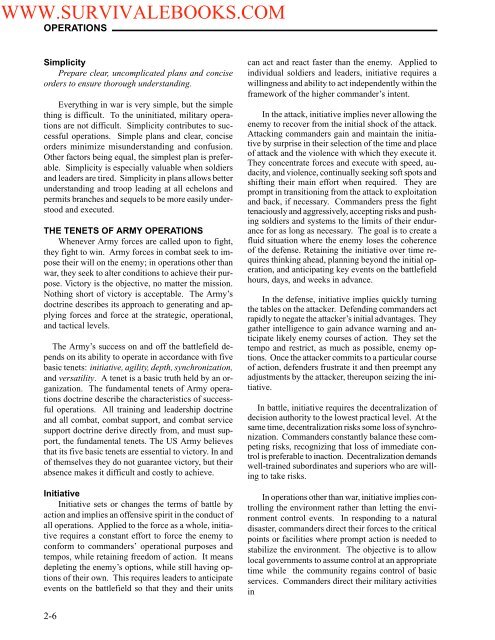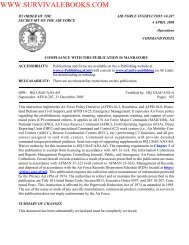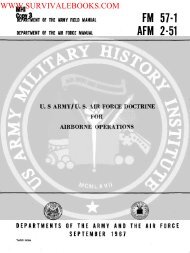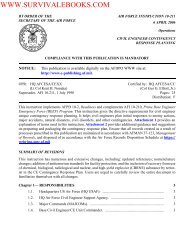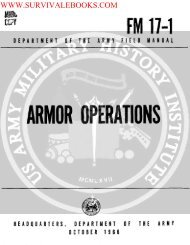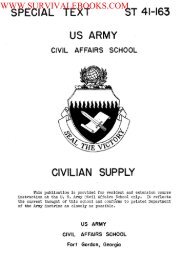FM 100-5 Operations - Survival Ebooks Military Manuals Survival ...
FM 100-5 Operations - Survival Ebooks Military Manuals Survival ...
FM 100-5 Operations - Survival Ebooks Military Manuals Survival ...
Create successful ePaper yourself
Turn your PDF publications into a flip-book with our unique Google optimized e-Paper software.
WWW.SURVIVALEBOOKS.COMOPERATIONSSimplicityPrepare clear, uncomplicated plans and conciseorders to ensure thorough understanding.Everything in war is very simple, but the simplething is difficult. To the uninitiated, military operationsare not difficult. Simplicity contributes to successfuloperations. Simple plans and clear, conciseorders minimize misunderstanding and confusion.Other factors being equal, the simplest plan is preferable.Simplicity is especially valuable when soldiersand leaders are tired. Simplicity in plans allows betterunderstanding and troop leading at all echelons andpermits branches and sequels to be more easily understoodand executed.THE TENETS OF ARMY OPERATIONSWhenever Army forces are called upon to fight,they fight to win. Army forces in combat seek to imposetheir will on the enemy; in operations other thanwar, they seek to alter conditions to achieve their purpose.Victory is the objective, no matter the mission.Nothing short of victory is acceptable. The Army’sdoctrine describes its approach to generating and applyingforces and force at the strategic, operational,and tactical levels.The Army’s success on and off the battlefield dependson its ability to operate in accordance with fivebasic tenets: initiative, agility, depth, synchronization,and versatility. A tenet is a basic truth held by an organization.The fundamental tenets of Army operationsdoctrine describe the characteristics of successfuloperations. All training and leadership doctrineand all combat, combat support, and combat servicesupport doctrine derive directly from, and must support,the fundamental tenets. The US Army believesthat its five basic tenets are essential to victory. In andof themselves they do not guarantee victory, but theirabsence makes it difficult and costly to achieve.InitiativeInitiative sets or changes the terms of battle byaction and implies an offensive spirit in the conduct ofall operations. Applied to the force as a whole, initiativerequires a constant effort to force the enemy toconform to commanders’ operational purposes andtempos, while retaining freedom of action. It meansdepleting the enemy’s options, while still having optionsof their own. This requires leaders to anticipateevents on the battlefield so that they and their unitscan act and react faster than the enemy. Applied toindividual soldiers and leaders, initiative requires awillingness and ability to act independently within theframework of the higher commander’s intent.In the attack, initiative implies never allowing theenemy to recover from the initial shock of the attack.Attacking commanders gain and maintain the initiativeby surprise in their selection of the time and placeof attack and the violence with which they execute it.They concentrate forces and execute with speed, audacity,and violence, continually seeking soft spots andshifting their main effort when required. They areprompt in transitioning from the attack to exploitationand back, if necessary. Commanders press the fighttenaciously and aggressively, accepting risks and pushingsoldiers and systems to the limits of their endurancefor as long as necessary. The goal is to create afluid situation where the enemy loses the coherenceof the defense. Retaining the initiative over time requiresthinking ahead, planning beyond the initial operation,and anticipating key events on the battlefieldhours, days, and weeks in advance.In the defense, initiative implies quickly turningthe tables on the attacker. Defending commanders actrapidly to negate the attacker’s initial advantages. Theygather intelligence to gain advance warning and anticipatelikely enemy courses of action. They set thetempo and restrict, as much as possible, enemy options.Once the attacker commits to a particular courseof action, defenders frustrate it and then preempt anyadjustments by the attacker, thereupon seizing the initiative.In battle, initiative requires the decentralization ofdecision authority to the lowest practical level. At thesame time, decentralization risks some loss of synchronization.Commanders constantly balance these competingrisks, recognizing that loss of immediate controlis preferable to inaction. Decentralization demandswell-trained subordinates and superiors who are willingto take risks.In operations other than war, initiative implies controllingthe environment rather than letting the environmentcontrol events. In responding to a naturaldisaster, commanders direct their forces to the criticalpoints or facilities where prompt action is needed tostabilize the environment. The objective is to allowlocal governments to assume control at an appropriatetime while the community regains control of basicservices. Commanders direct their military activitiesin2-6


